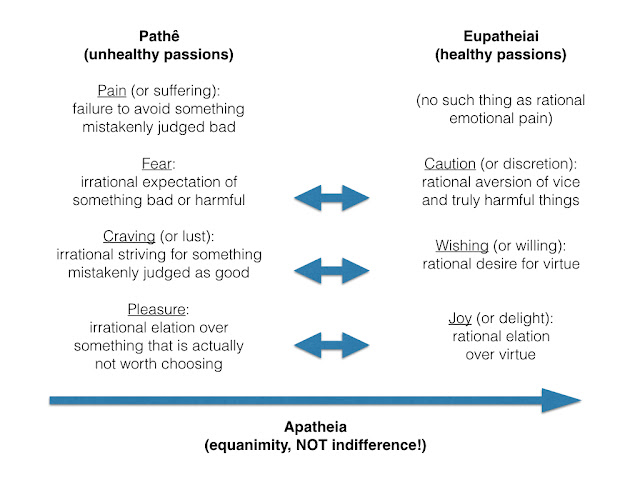According to the Stoics there is an eight-fold division of the soul: the five senses, the faculty of speech, the intellectual faculty, which is the mind itself, and the generative faculty, being all parts of the soul.
Now from falsehood there results perversion, which extends to the mind; and from this perversion arise many passions or emotions, which are causes of instability. Passion, or emotion, is defined by Zeno as an irrational and unnatural movement in the soul, or again as impulse in excess.
The main, or most universal, emotions, according to Hecato in his treatise On the Passions, Book II, and Zeno in his treatise with the same title, constitute four great classes: grief, fear, desire or craving, pleasure.
They hold the emotions to be judgements, as is stated by Chrysippus in his treatise On the Passions: avarice being a supposition that money is a good, while the case is similar with drunkenness and profligacy and all the other emotions.
And grief or pain they hold to be an irrational mental contraction. Its species are pity, envy, jealousy, rivalry, heaviness, annoyance, distress, anguish, distraction.
Pity is grief felt at undeserved suffering; envy, grief at others' prosperity; jealousy, grief at the possession by another of that which one desires for oneself; rivalry, pain at the possession by another of what one has oneself.
Heaviness or vexation is grief which weighs us down, annoyance that which coops us up and straitens us for want of room, distress a pain brought on by anxious thought that lasts and increases, anguish painful grief, distraction irrational grief, rasping and hindering us from viewing the situation as a whole.
Fear is an expectation of evil. Under fear are ranged the following emotions: terror, nervous shrinking, shame, consternation, panic, mental agony.
Terror is a fear which produces fright; shame is fear of disgrace; nervous shrinking is a fear that one will have to act; consternation is fear due to a presentation of some unusual occurrence; panic is fear with pressure exercised by sound; mental agony is fear felt when some issue is still in suspense.
Desire or craving is irrational appetency, and under it are ranged the following states: want, hatred, contentiousness, anger, love, wrath, resentment.
Want, then, is a craving when it is baulked and, as it were, cut off from its object, but kept at full stretch and attracted towards it in vain.
Hatred is a growing and lasting desire or craving that it should go ill with somebody.
Contentiousness is a craving or desire connected with partisanship; anger a craving or desire to punish one who is thought to have done you an undeserved injury.
The passion of love is a craving from which good men are free; for it is an effort to win affection due to the visible presence of beauty.
Wrath is anger which has long rankled and has become malicious, waiting for its opportunity, as is illustrated by the lines:
Even though for the one day he swallow his anger, yet doth he still keep his displeasure thereafter in his heart, till he accomplish it.
Resentment is anger in an early stage.
Pleasure is an irrational elation at the accruing of what seems to be choiceworthy; and under it are ranged ravishment, malevolent joy, delight, transport.
Ravishment is pleasure which charms the ear. Malevolent joy is pleasure at another's ills. Delight is the mind's propulsion to weakness, its name in Greek (τέρψις) being akin to τρέψις or turning. To be in transports of delight is the melting away of virtue.

No comments:
Post a Comment